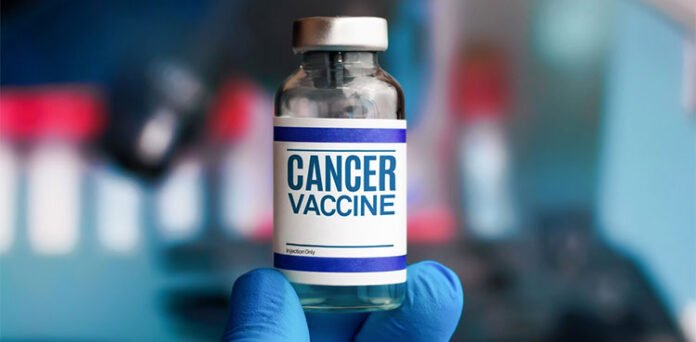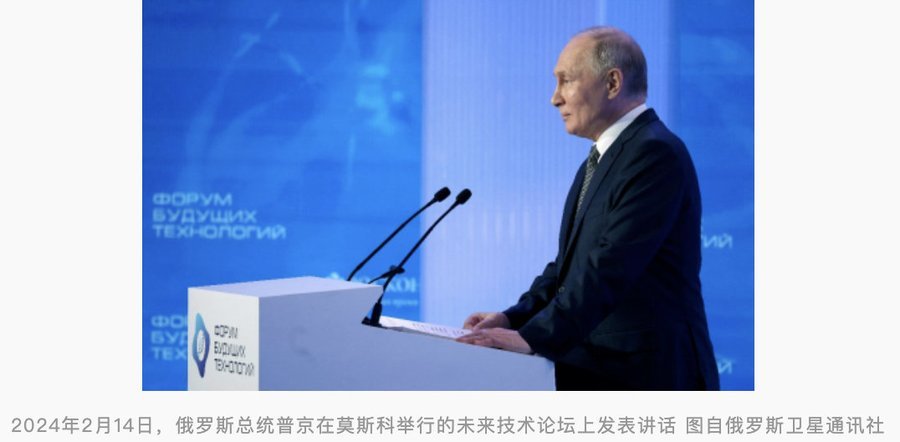At a forum on future technologies in Moscow on Wednesday, Russian President Vladimir Putin announced that Russian scientists are close to creating vaccines against cancer. He did not specify which types of cancers the proposed vaccines would target on February 15.
The development of a cancer vaccine would represent a significant breakthrough in the field of medicine and could potentially provide a new method of individualized therapy for cancer patients.
#BREAKING: Putin says Russia is close to creating cancer vaccines.#Putin #CancerVaccine #Cancer #Vaccine #Russia #VladimirPutin #JUSTIN
Here's the announcement pic.twitter.com/u8fRIqatow
— Lucy & Rocky (@lucyeglute) February 17, 2024
International Work on Cancer Vaccines
A number of countries and companies globally are working to develop cancer vaccines. Last year, the UK government signed an agreement with Germany-based biotechnology company BioNTech to launch clinical trials aimed at providing “personalized cancer treatments” to 10,000 patients by 2030.

Pharmaceutical giants Moderna and Merck & Co. are also collaborating on an experimental cancer vaccine that has shown promising results in a mid-stage study. The vaccine cut the chance of recurrence or death from melanoma – the most deadly form of skin cancer – by approximately 50% after three years of treatment.
According to the World Health Organization, there are currently six licensed vaccines against human papillomaviruses (HPV) that can cause many cancers including cervical cancer, as well as vaccines against Hepatitis B virus (HBV), which can lead to liver cancer.
Russian Development of Sputnik V Covid-19 Vaccine
During the coronavirus pandemic, Russia developed and distributed its own Sputnik V vaccine against COVID-19 to a number of countries around the world. However, domestically in Russia, there was widespread public reluctance to get vaccinated against the virus.
In an effort to boost confidence in the safety and efficacy of the Sputnik V shot, Putin himself stated he had taken the Russian-made vaccine. The Sputnik program demonstrated Russia’s biomedical research and development capabilities.
Putin’s Health a Subject of Speculation for Years
The news about Russian President Vladimir potentially having cancer first emerged in June 2022, when a classified U.S. intelligence report indicated Putin had undergone treatment for advanced cancer the previous April.
The intelligence report also mentioned an unsubstantiated claim about an assassination attempt on Putin’s life in March 2022.

Putin’s health and medical status have been the subject of intense speculation for many years.
In October 2023, there were unfounded rumors that Putin had suffered a cardiac arrest, leading to hundreds of thousands of Russians searching online for information.
However, during Putin’s first regional trip of 2024 in January, a Russian doctor surprisingly gave Putin a clean bill of health, assessing his condition as “excellent” while advising the 70-year-old leader to get more rest to aid longevity.
Putin’s prolonged isolation during the pandemic has made it more difficult for U.S. intelligence agencies to precisely evaluate his health status.
Despite the health concerns, Putin announced in December 2023 that he would be running for re-election as President.
While Putin touts a Russian “cancer vaccine” breakthrough, his own medical condition remains opaque and a topic of intense interest within the Biden administration in the United States.
Reactions to Putin’s Cancer Vaccine Claim
Putin’s bold announcement about the impending creation of cancer vaccines by Russian scientists was met with a mix of reactions from experts and analysts around the world.
Some praised the potential breakthrough as a great advance if realized, noting cancer is one of the leading causes of death globally and any new effective treatments would be hugely beneficial. However, many also expressed skepticism given the lack of details provided.
“If Russia has truly made significant progress in developing viable cancer vaccines, that could be a momentous achievement. But the scant information shared raises a lot of questions,” said Dr. Karen Hendricks, an oncologist at Johns Hopkins University. “We would need much more data and transparency from Russian researchers before getting our hopes up too high.”
Geopolitical analysts pointed out the announcement conveniently aligned with Putin’s political needs amid concerns about his health and strongman image. They suggested it could be an attempt to project Russian scientific prowess and stoke nationalist sentiment ahead of Putin’s expected re-election bid.
The Kremlin did not provide any further specifics in the wake of the announcement. Only time will tell if Russian scientists can deliver on Putin’s lofty claims about cancer vaccines. But many global observers remain doubtful for now.
Read about Hunter Biden’s tax evasion case, here.












Comments 2